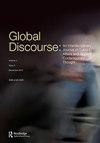Circular relations between climate knowledge and action: a reply to ‘Why do climate negotiations stall? Scientific evidence and solutions for some structural problems’, by Ulrich Frey and Jazmin Burgess
IF 1.4
Q2 INTERNATIONAL RELATIONS
引用次数: 2
Abstract
In this response to Frey and Burgess, I describe the ‘direct and sustained relationship’ between climate researchers and policymakers that has been created through the Intergovernmental Platform on Climate Change (IPCC) assessment practice and the conscious attempts to link the IPCC and climate negotiations in the United Nations Framework Convention on Climate Change (UNFCCC). Member governments have a central role in the IPCC assessment practice, from outlining the assessment report to approving its key findings. While this creates a shared knowledge base for the negotiation of collective action, it also brings negotiating positions into the approval of the report’s Summary for Policymakers. This negotiation of knowledge has further intensified as the IPCC has become a site for legitimating objects and outcomes from the negotiating process, such as the 1.5C temperature target. Exploring the role of the IPCC in the Global Stocktake reveals how the circle between knowledge and action may be closing, although questions of diversity and in particular the place of the Local Community and Indigenous Peoples Platform in this circle remain.气候知识与行动之间的循环关系:对“气候谈判为何停滞?”一些结构性问题的科学证据和解决方案”,作者:乌尔里希·弗雷和贾兹明·伯吉斯
在对弗雷和伯吉斯的回应中,我描述了气候研究人员和政策制定者之间的“直接和持续的关系”,这种关系是通过政府间气候变化平台(IPCC)的评估实践和有意识地将IPCC与联合国气候变化框架公约(UNFCCC)的气候谈判联系起来而建立起来的。成员国政府在IPCC的评估实践中发挥着核心作用,从概述评估报告到批准其主要发现。这为集体行动的谈判创造了一个共享的知识库,同时也将谈判立场纳入了报告《决策者摘要》的批准。随着IPCC成为使谈判过程的目标和结果(如1.5摄氏度的温度目标)合法化的场所,这种知识谈判进一步加剧。对IPCC在全球评估中的作用的探讨揭示了知识与行动之间的循环是如何闭合的,尽管多样性问题,特别是地方社区和土著人民平台在这一循环中的地位问题仍然存在。
本文章由计算机程序翻译,如有差异,请以英文原文为准。
求助全文
约1分钟内获得全文
求助全文
来源期刊

Global Discourse
Social Sciences-Political Science and International Relations
CiteScore
4.10
自引率
6.70%
发文量
64
期刊介绍:
Global Discourse is an interdisciplinary, problem-oriented journal of applied contemporary thought operating at the intersection of politics, international relations, sociology and social policy. The journal’s scope is broad, encouraging interrogation of current affairs with regard to core questions of distributive justice, wellbeing, cultural diversity, autonomy, sovereignty, security and recognition. All issues are themed and aimed at addressing pressing issues as they emerge.
 求助内容:
求助内容: 应助结果提醒方式:
应助结果提醒方式:


